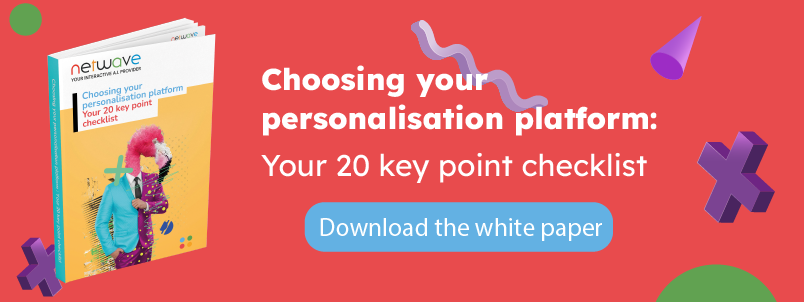
Are you thinking of adopting a personalised product recommendation platform? It's a great idea! It will help you improve your customer experience and save time in your sales animation. It will even allow you to increase your sales significantly! However, choosing the right tool that will enable you to create real value is important. For this, ease of configuration is essential. Here are some explanations.
Customised product recommendation platform: why
easy, customised setup is necessary.
The ease of configuration is a key element of the usefulness of a personalised product recommendation software solution. Indeed, this customisation possibility allows the company to adapt the software to its specificities and sales and marketing needs and objectives by emphasising certain products or product categories, for example. In addition, the custom configuration allows the company to maintain the solution's relevance by updating the configuration according to commercial and economic evolutions. Finally, this feature can make the explanation easier and more intuitive to use and manage, especially in terms of responsiveness. In short, a simple and customised configuration is a significant asset for the company: it is even the sine qua non-condition for the profitability and durability of the personalised product recommendation platform.
Personalised product recommendation and
customizability criteria
▪ The ability to communicate your business strategy
The AI tool behind your personalisation platform (if it's not a machine learning tool but a tool capable of individualising advice) can be considered your salesperson. Or instead, as your salesperson, it will allow you to put a salesperson in front of each visitor.
And, as you would with your physical wind force, it is essential that your "artificial salespeople" sell within the framework of your commercial policy and your specific positioning. A specialised retailer expects different things from its salespeople than a hyper discount retailer. Your sales policy will change, especially in case of overstock on certain items.
It is, therefore, essential that your personalisation tool, your salesperson, allows you to communicate your sales policy to ensure that your sales are made within the framework of this policy. And, of course, it can make this brief evolve quickly with just a few clicks.
You will then have an army of "artificial salespeople" who apply your sales strategy - not just a statistical projection – and know how to adapt immediately during its evolution.
▪ CRM data integration
Your product recommendation tool configuration must allow you to integrate your CRM data. The challenge here is to reinforce the relevance and consistency of your personalisation work, i.e., to make it more efficient and acceptable to your visitors.
Indeed, your customer knowledge has a value that can be used in dynamic personalisation. Your tool must therefore be able to easily integrate the CRM data you deem essential and use it to make your device even more relevant.
The simple navigation tracking will not allow knowing if the anonymous visitor is carrying your loyalty card. Or if you have classified him as a Gold customer. Or if he has just made an offline purchase. So much data that can be important.
The integration of your CRM data will allow you to enrich the granularity of the information available to your personalisation tool and thus increase the relevance of its analysis (if it performs it in real-time, of course) and, at the most, to create visitor typologies based on your data and which would justify a particular commercial strategy.
Read also: Product recommendation, the five key features of a personalisation solution.
▪ Specification of a standard configuration
Your platform must include a standard configuration reflecting the best practices resulting from its experience. But the combination of your business, your positioning, and your business model is unique, and you should easily adapt this standard to your specificities.
Not all sites are alike. To have only a single, unspecifiable standard (which is the case for many small platforms on the market) is to presuppose that a site that sells its brand has the exact needs of a multi-brand site, that a hyper-specialized site has the exact needs of a generalist site; that a high-end niche site has the same needs as a discounter; that a classic merchant site has the exact needs as a site that makes 50% of its sales in the marketplace...
The issue here is twofold:
- A quick start, thanks to a standard configuration.
- A customisation strategy adapted to your specificity thanks to the ability to specify.
▪ Configuration of specific engines and specific manual rules in no code
The configuration of your engines (those that are not standard in your solution) and of specific manual rules in no code is essential to control your costs and to show reactivity, without which you risk 1/ not being able to adjust your solution to your specificities 2/ missing out on commercial opportunities.
Most of the platforms on the market embed the rules in their code. This lack of customizability is a real danger to the relevance of your recommendations. Indeed, it will not allow you to have the flexibility that the web and its speed of execution require. As a result, you will be behind your competitors' initiatives and the evolution of consumption.
Instead, configuring specific manual engines and rules in no code will allow you to:
- React immediately: no development time is required. You have control and can set up new rules directly in the software.
- Control your costs: no additional development costs and your annual budget is controlled (and will remain so).
- Adapt, if necessary, in case of evolution.
▪ Compatibility with all e-commerce/marketplace platforms on the market
Your personalised product recommendation solution must be compatible with the standard tools on the market. It must allow you to publish in HTML or JSON, leaving you the choice of publishing technology.
It must be fully compatible with the primary market standards in terms of tag management and product flow management. You will significantly increase your deployment and maintenance costs if it is not.
Read also: Personalisation solution: what ROI to expect?
Netwave is an easy setup for a fast ROI
Netwave is a 3Rd technology that provides personalised recommendations to each visitor of your e-commerce site or marketplace. Our method involves understanding your visitors in real-time by analysing each visit's contextual, behavioural, and psychological dimensions without trying to classify them into a predefined segment. This approach allows us to offer each visitor the product that is most likely to convert them based on the weak signals they leave during their browsing.
For optimal efficiency and relevance, Netwave offers easy and customised configuration:
- Netwave integrates 30 types of CRM data to enrich its knowledge and build strategies based on your segmentation.
- Netwave provides a complete library of e-commerce best practices, which you can quickly adapt.
- Netwave works in "full configuration" mode: everything is configurable, without coding. You can even create your recommendation engines by playing with 12 variables.
- Netwave is compatible with all e-commerce/marketplace platforms on the market.
- Netwave allows users to set additional recommendations, prioritise personalisation rules and even communicate a business strategy to the AI as they would to a sales team.
Serge Roman, E-commerce Manager at Cobra, a Netwave customer, says: "With Netwave, we can add our touch by manually setting certain rules. And what's great about the tool is that we can see if our personalisation is more or less effective than the tool's so-called intelligent personalisation. So we can check if we are right or wrong. And if we are wrong, we have to remove this setting and let the tool make its more relevant recommendations. With the other solutions we looked at, there was no competitive bidding or A/B testing, which is very annoying."
Would you like to read Serge Roman's complete testimonial on the collaboration between Cobra and Netwave? Download the case study!


